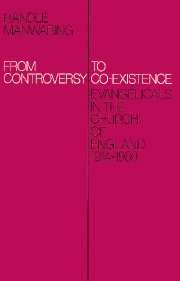Book contents
- Frontmatter
- Contents
- Acknowledgements
- Preface
- 1 Into battle
- 2 The defensive years
- 3 Through the Waste Land
- 4 Continuing nadir
- 5 The turning tide
- 6 Towards the conversion of many
- 7 Flood-tide of Evangelism
- 8 Anatomy of Evangelicalism
- 9 The Fundamentalist issue
- 10 The hard facts of Evangelicals and unity
- 11 The Honest to God debate
- 12 Liturgical debates
- 13 Charismatic differences
- 14 Keele – a watershed
- 15 Evangelical identity – a problem
- Notes
- Index
15 - Evangelical identity – a problem
Published online by Cambridge University Press: 18 September 2009
- Frontmatter
- Contents
- Acknowledgements
- Preface
- 1 Into battle
- 2 The defensive years
- 3 Through the Waste Land
- 4 Continuing nadir
- 5 The turning tide
- 6 Towards the conversion of many
- 7 Flood-tide of Evangelism
- 8 Anatomy of Evangelicalism
- 9 The Fundamentalist issue
- 10 The hard facts of Evangelicals and unity
- 11 The Honest to God debate
- 12 Liturgical debates
- 13 Charismatic differences
- 14 Keele – a watershed
- 15 Evangelical identity – a problem
- Notes
- Index
Summary
Throughout their history, Evangelicals have been proud to own that name but, since Keele, many of them have questioned its meaning and younger Evangelicals, notably those leaving theological college, have wondered whether they would be more acceptable generally if they were known simply as Anglicans, or even, merely as Christians. These views have been held partly in the hope of ending what some see as a divisive party spirit, for so long the bogey of comprehensive Anglicanism, and partly in an endeavour to draw nearer to non-Evangelicals. Evangelicals have held, obviously in opposition to their Anglo-Catholic brethren, that Evangelicalism is the equivalent of historic Anglicanism but, since the Oxford Movement, there had been a tendency for parts of the Church of England to drift from biblical anchorage, moving towards a return to medievalism and, in recent decades, leading evangelical theologians and scholars like Dr Jim Packer, the Rev. John Stott and the Rev. Roger Beckwith, have done a great deal not only to substantiate but also to clarify the Evangelical position within Anglicanism, also to move away from an entrenched position behind a previously held very Protestant Evangelicalism: ‘What name we take or others give us is a trifling question in comparison with the great doctrines by which we seek to live, and whether they are true.’
- Type
- Chapter
- Information
- From Controversy to Co-ExistenceEvangelicals in the Church of England 1914–1980, pp. 191 - 211Publisher: Cambridge University PressPrint publication year: 1985



